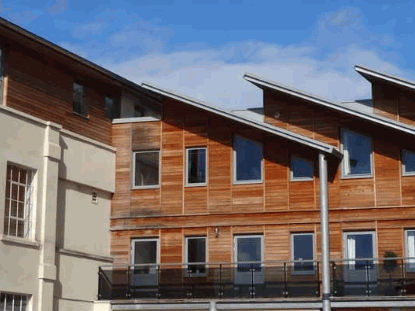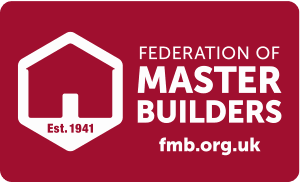Exterior cladding has a huge range of benefits. It can really make a world of difference in both residential and commercial buildings, but in order to do so, it has to be well maintained.
One essential task when it comes to maintaining cladding is to clean cladding regularly. By sticking to a regular cladding cleaning schedule and removing surface dirt, we can ensure that we get the most out of our cladding.
Many people, however, find the cladding cleaning process daunting. That's where NW Wash comes in. As a professional cleaning company, we can make your exterior cladding look brand new.
If your cladding needs some TLC and you're not sure where to begin, here's everything you need to know about cladding cleaning. Remember - if in doubt, hire professionals like the NW Wash team!

Cladding sits on the outside of our buildings, which often leads to people wondering why they should bother to clean it. After all, surely it's designed to be used outside?
While this is true, it is still crucial to clean cladding for a multitude of reasons. For example:
Cladding is one of the first things that people see when they visit a property. It can make or break their first thoughts on the property, and, in the case of large commercial properties, it can really help gain potential customers' trust. By maintaining your cladding, you can ensure that your building looks just as good as the services you offer.
Giving the right impression is half the job when you're trying to sell or market a product or a service.
Cladding is a resistant material, and it can usually hold its own against most things. However, sometimes, cladding can get damaged. One way to ensure that you minimise the risk of damage to your cladding.
Things like mould, bird droppings, algae, and mildew can all wear away at cladding materials. This can cause long-term and irreparable damage. This can be costly to replace or repair, and is always best to catch early!
Explore: Does Pressure Washing Damage Roof Tiles
Since there is less on the cladding causing it damage, you will find that cleaning cladding actually prolongs the lifespan of it. This means you will get much more for your money if you do regular cladding maintenance.
A longer life is always a good thing when it comes to large investments like cladding!

A lot of cladding company warranties dictate that the cladding must be well taken care of. By that, they mean it must be cleaned on a regular basis. Failing to do so may mean that should you face any issues with your cladding, you may not be able to claim.
It is important to note that there are a few different types of cladding, and each type of cladding must be cleaned and handled in a different way because no two cladding materials are the same.
So if you intend to clean your cladding yourself, you must make sure you know exactly what kind of cladding material you've got before you start cleaning work. Likewise, when working with cleaning professionals, you should be sure to give as much information about your cladding as possible. Professional cleaning companies will know how to expertly handle each material in order to provide the best cleaning services.
You might have any of the following types of cladding:
Zinc cladding is often chosen because it is fire-resistant, insect-proof, and classed as a fungistat, meaning it is resistant to organic growth like fungi. It can last for a very long time if treated well and can look great on the side of large commercial buildings.

Easy and fast to install, PVC cladding provides companies with noticeable energy savings. It is a great thermal insulator and helps to reduce condensation within the property. As a result, it's a very popular choice.

Aluminium is another metal cladding material that is quite common. It's known for its UV resistance, easy installation, and waterproof qualities. Aluminium is considered to be a strong cladding material, but it is also very lightweight.

uPVC is weather-resistant and stylish, and it is usually a very cheap way to clad a building - making it very popular! It's considered to be stylish and low maintenance, so is becoming more and more common.
Other metal materials can be used to clad buildings. These are typically resilient and strong, fire resistant and often sustainable, and can give a commercial building a great look.
Another great option for thermal insulation, wood cladding can also help to provide sound insulation, too. It's incredibly durable as a cladding material and can be sourced sustainably.
When cleaning metal cladding, you should never use chemicals. These can damage the coating and the metal itself and could void the warranty. Avoid all cleaning products.

Zinc is easily discoloured by cleaning products, so it must be cleaned carefully. It is often recommended to hire a professional to clean Zinc so that you do not wash or damage the coating.
To clean Zinc cladding:
Wood cladding needs to be cleaned much more often than other materials, which is an important factor to consider when choosing cladding. It is prone to mould, so needs more regular cleaning.
The best cleaning method for timber is:
You can technically use a jet wash on timber cladding but it can strip away exterior coatings. This can then make the wood more susceptible to weather damage. If you want to jet wash your wood cladding, we recommend paying for a cleaning service to get the job done right. Jet washing can be risky, so if trying it yourself, always test it on a small and inconspicuous area first.

Concrete is a hardy material, which is why it is so common in building work. It's like a brick in that it is a material that can absolutely be relied upon.
To clean cladding made of concrete you should either use a sponge and soapy water, or you can get out the pressure washer and start jet washing! The material is hard enough to withstand the force. Just be careful when jet washing, as it is a dangerous activity - safety is important.
For stubborn dirt and stains, use acetic acid and patch-treat the concrete. For organic growth, you can use hydrogen peroxide to kill and remove it. It should also prevent organic growth from returning for a while, too.
Stone cladding does not have a protective coating, so can be safely pressure washed if you do it at the right angle, PSI, and distance. Always follow the safety guidelines when you clean your cladding. Alternatively, it can be cleaned with soapy water. You should be sure to take care when cleaning stone cladding, especially with material like natural sandstone.
Take a look: Can You Pressure Wash Indian Sandstone

While you definitely can clean cladding yourself, it is easier more often than not to hire professional cladding cleaning services for regular cleaning work. We can work safely and get your cleaning job done, we know how to clean each surface and have the skills and kit to do so (things like telescopic poles and pressure washers aren't always easy to buy or use!).
Our customers swear by our service because whether it's timber panels or concrete cladding, we'll have it clean in no time at all and back to its original colour! For your free quote, contact NW Wash today and ask about our cleaning cladding service.



